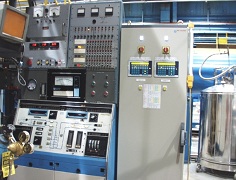
* This program does not require approval under the Private Career Colleges Act, 2005
Industrial automation is providing jobs for technically trained people who can build, program, integrate, service, maintain and operate PLCs. Acquire the technical skills and knowledge needed to work with electrical control systems typically found in an industrial environment, design ladder logic programs and perform tests. Simulate the operation of real-world components, including motors, solenoid valves and a wide variety of other discrete and analog input/output devices. This certificate program meets the needs of both employers who require a highly skilled technical workforce and students who require cost-effective, high-quality, fully accredited technical training.
Taught by an industry experienced and related certified instructor, this theory based course includes topic review as well as offers practice on answering sample examination questions.
The course offers a review of the following topics:
● Overview of PLCs
● Central Processing Unit
● I/O System
● Programming Terminals and Peripherals
● Installation and Maintenance of PLCs
● Relay Logic
● Ladder Logic
● Timers
● Counters
● MCR, JUMP and FORCE Instructions
● Sequencers
● Data Transfer
● Math Functions
● Process Control
● Data Communications
● Number Systems and Codes
● Digital Logic
● Advanced Programming Languages
● Robotics
Registration is open to anyone 18 years of age or older. This course is recommended for persons with related experience.
Programming PLCs can be a profitable career. Hourly rates go from $65 to $125 for an experienced PLC programmer. Individuals who graduate from these programs of study have the entry level skills required to succeed in a competitive market. Students must develop logical thinking skills, problem solving skills, and trouble shooting skills in order to be successful both in the program and in the field after graduation. PLC Technicians install and repair industrial electronic equipment including I/O networks, data highways, variable speed drives, process control equipment, and write PLC programs for a wide variety of automated control systems ranging from simple on-off control to robotics. In addition to installing and maintaining programmable controllers, PLC Technicians also find employment in the industrial engineering field where they are actively involved in the design and implementation of PLC control systems.
Working conditions are generally excellent for PLC Technicians with very good pay and benefits including health and pension plans for graduates finding employment in this fast-growing field. PLC Technicians involved in design or repair of industrial control equipment generally work in clean, well-lighted, air-conditioned surroundings such as an office or testing and repair facility.
Experienced PLC Technicians with advanced training may become specialists or troubleshooters who help other technicians diagnose difficult problems, or work with engineers in designing equipment and developing maintenance procedures. Graduates with leadership ability also may eventually become maintenance supervisors or service managers. Due to the highly specialized skills and knowledge required, there are many opportunities available to graduates in the service sector where there is a great demand for contract and sub-contract work with smaller manufacturing and distribution companies. Some experienced PLC Technicians open their own design, installation and maintenance companies or become wholesalers or retailers of PLC equipment. Other career prospects include inside and outside sales of PLC. Because of their familiarity with the electronic equipment, PLC Technicians are particularly well qualified to become manufacturers’ sales representatives.